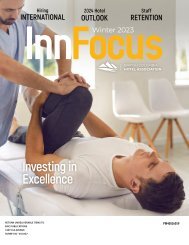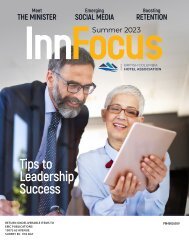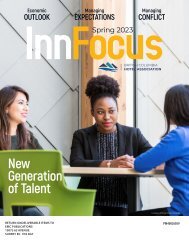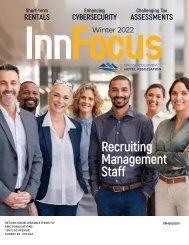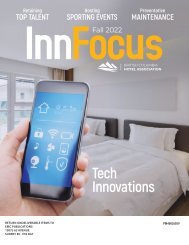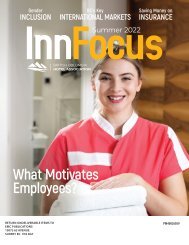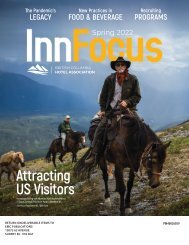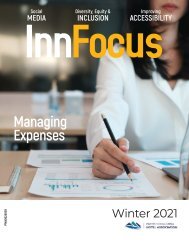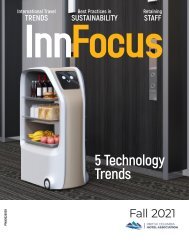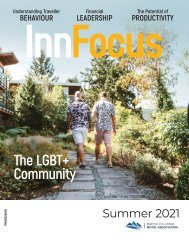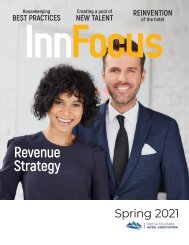InnFocus Fall 2020
InnFocus magazine for hoteliers in British Columbia
InnFocus magazine for hoteliers in British Columbia
Create successful ePaper yourself
Turn your PDF publications into a flip-book with our unique Google optimized e-Paper software.
Touchless
Technology
Strategy Meeting
Topics
Diversity &
Inclusivity
Evolution
of Space
PM40026059
Fall 2020
contents
5
8
20
Evolution of Space
Create spaces where guests can feel secure
Touchless Technology
Technology is helping hotels provide a contactless experience for guests
Celebrating Diversity & Inclusion
Diverse teams directly impact the quality of the guest experience
Regulars
4 BCHA Report
9 BC Hospitality Foundation
23 BCHA Member Engagement
23 What’s New?
Regional
Feature
16 Vancouver
26
extras
Five Scary Topics for a Strategy Meeting
Face uncomfortable realities with your team
13 BCHA’s GoGreen Program
14 Does Your COVID-19 Safety Plan Need a Refresh?
19 Hotel Salespeople, Take Note:
Video Email Will Bring Your Virtual Tours to Life
Cover photo courtesy of
JW Marriott Parq Vancouver
24 Meetings and Conferences During COVID-19:
Patience, Protocols and Phasing into the Future
30 Six Ways Benchmarking can Support
Post-pandemic Recovery
200-948 Howe Street,
Vancouver, BC V6Z 1N9
T 604-681-7164 1-800-663-3153
www.bcha.com
@bchotelassoc
@BCHotelAssociation
bchotelassociation
BCHA Team
Ingrid Jarrett
President & CEO
Mike Macleod
Director Member
and Business Development
Karissa Bourgeault
Executive Assistant & Board Liaison
Kelsey Millman
Communications for BCHA
(Beattie Tartan)
Dylan Tomlin
Energy Analyst
Samantha Glennie
Office Coordinator
2019/2020 Board of Directors
Executive Committee
Chair - Bryan Pilbeam
Vice Chair - Jonas Melin
Past Chair – John Kearns
Treasurer – David McQuinn
Executive Committee Director – David MacKenzie
Executive Committee Director – Vivek Sharma
President & CEO - Ingrid Jarrett
Lower Mainland
Doug Andrews
John Kearns
David MacKenzie
Jonas Melin
Brian Rohl
Vancouver Island South
Stephen Roughley
Chris Watson
Vancouver Island North
Stewart Instance
Central BC
Brady Beruschi
Bryan Pilbeam
Eastern BC
Vivek Sharma
Barry Zwueste
Northern BC
Angie Eccleston
Eleanor Ryan
At Large
David McQuinn
Ian Powell
PUBLICATIONS MAIL AGREEMENT
NO. 40026059
RETURN UNDELIVERABLE
CANADIAN ADDRESSES TO
CIRCULATION DEPT EMC
PUBLICATIONS
19073 63 AVENUE
SURREY BC V3S 8G7
email: info@emcmarketing.com
InnFocus is published quarterly
by EMC Publications - a division
of EMC Executive Marketing Consultants Inc.
19073 63 Avenue, Surrey, BC, V3S 8G7
t 604-574-4577 1-800-667-0955
info@emcmarketing.com
www.emcmarketing.com
Publisher & Editor: Joyce Hayne
Design & Layout: Krysta Furioso
by Ingrid Jarrett, President & CEO
Since the last publication of InnFocus, it is difficult to comprehend how
drastically our industry continues to be impacted by the COVID-19
pandemic. In June, we were all hopeful we would move to Phase 3, and
get back to business: rehiring our teams and once again welcoming
guests in the warm, hospitable way we are known for worldwide. But
as the summer played out, the reality of the market restrictions—which
included border closures, complete shut down of the cruise industry,
meetings and group market, along with the tour and even domestic
markets—proved to be crippling for our industry.
Of course, select regions of BC that are historically popular among
BC and Alberta residents, such as the Okanagan, Tofino, Parksville
corridor, and Whistler, did see strong summer demand. However,
those areas are small destinations that are simply not representative
of the BC accommodation industry at large. In gathering industry data
and occupancy averages from regions across the province, all reports
offered sobering results with historically unmatched lows for RevPar
and occupancy levels.
Compared to 82.9% occupancy that was reported for hotels across BC
in July of 2019, 2020 brought a mere 44.2% average along with an average
daily rate drop of 33.4%. RevPAR also decreased to 64.5% and room
revenue sat at 65.2%. The harsh reality of this is that it will be hard work to
recover, and it will not be a short recovery. Our industry needs to dig deep,
brace ourselves, and support one another. The forecast for the fall is dire.
As the voice of the accommodation industry, the BCHA continues
to work with TIABC, ABLE, BCRFA, and Restaurants Canada at the
provincial level, along with Hotel Association of Canada and the Canadian
Hotel and Lodging Association on a national scale. In taking our role
with utmost sincerity, we have been able to submit recovery strategies
and recommendations to government and advocate on the issues that
will determine if many businesses will be able to stay solvent in the long
run or not. These issues include property tax relief, business capital,
low interest loans, temporary lay-off extension, and the extension of the
CEWS program, among others.
We have successfully forged new partnerships with STR and the BC
Regional Secretariat and continue to develop revenue management
education sessions to support growing industry excellence in recovery.
In addition, our partnership agreement with FortisBC is off to a great start
with more hotels than anticipated signing up with our Energy Analyst to
support energy savings at the property level. We have also continued to
add educational opportunities to support learning along with the mental
and emotional well-being of our industry during this tenuous time. As
more people have begun travelling, dining, and meeting once again, there
has been a heightened sense of fear in our culture, making it especially
important for us all to support our employees with the skills and training
to foster morale and facilitate success. Our joint webinar with go2HR
on diversity and mitigating violence was fundamental to this training.
With the borders closed, no indication that international travel will
resume any time soon, compounding cases across the province, and a
focus on re-opening education this fall, we face the reality that the impact
of this pandemic will likely be much greater and take much longer to
recover than first forecast.
Our small but mighty team has their hands full, but we continue to
remain highly engaged, advocating for fiscal support on both a federal
and provincial level. We are committed to being agile and disseminating
important information that will benefit you during this difficult time. We
also remain dedicated to developing meaningful education programs
and training to support in long-term recovery.
The BCHA has also continued to work closely with our industry
leaders, which include the Metro Vancouver Response and Recovery
Task Force, of which I am a co-chair, Destination British Columbia on
recovery marketing strategies, the BCDMOA network, and our industry
as a whole. On behalf of the BCHA, we wish you and your loved ones
health and wellness and promise to do all in our power to support each
of you, your businesses, and your employees.
Stay safe and stay well.
4 InnFocus
Courtesy of Pluvio
Courtesy of JW Marriott Parq Vancouver
The
Evolution
of Space
by Chris McBeath
If cleaning is the biggest priority in the hospitality industry
right now, the next biggest is redesigning hotel spaces with
enough flexibility to accommodate every coronavirus-related
rule of cleanliness and social distancing—all while keeping
guest comfort and safety intact.
InnFocus InnFocus 5 5
In many cases, the global pandemic has
accelerated industry transitions already
underway, such as mainstreaming fully
integrated technology, retrofitting building
infrastructure, and repurposing space for
greater flexibility.
Ushering guests through the hotel lobby
and to their rooms has become a no-touch art
unto itself—and negotiating communal spaces
like health clubs, salons, and swimming pools
is an entirely different animal. Designers
and architects are already reimagining hotel
amenities, along with lobbies, meeting areas
and back-of-house operations, through
the lens of physical distancing and hygiene
requirements. Where it took more than a
decade for green technology to gain serious
traction in design and construction, COVIDinspired
clean promises a far speedier
integration.
Reconfiguring Space
“Social distancing goes against the
psychology of a hospitality experience,” says
Dr. Stephani Robson, a former Vancouverite
who is currently a senior lecturer in hotel
and restaurant design at Cornell University’s
School of Hotel Administration. “How do you
do this safely without giving off a vibe that
feels more like a medical facility? It’s a real
challenge.”
Dr. Robson suggests starting with smaller
seating groups in lobbies to offset crowding
around the front desk; facilitating health
checks; and offering no-touch registration
processes. Where space is tight, digital
queuing software might be considered, much
like a restaurant’s waitlist management and
paging system.
Courtesy of Inn at Laurel Point
“People feel comfortable when they can
defend their personal space,” continues Dr.
Robson. “Check-in could move into restyled
conference areas where, instead of plexiglass
barriers, there could be seating clusters
divided by bookshelves, plants, and easyto-move
cube furniture that also maintains
proper sight lines for an inviting atmosphere.
It’s about creating nooks and
crannies to feel more secure.
It’s not just placing seats far apart, it’s about
creating nooks and crannies to feel more
secure—booths with high backs and five-foot
partitions.” The same can be accomplished in
hotel restaurants and bars.
Before COVID-19, multi-use flex spaces
were already on-trend, and these scenarios
can be easily translated to restaurant dining
6 InnFocus
where social distancing capacities are drastically impacting revenues.
Today, guests might expect to eat in many different hotel spaces, such as
themed conference rooms, pool patios or garden areas—anywhere that
creates a memorable experience. Such dining options lend themselves
to pitchers and large platters, where guests seated together can serve
themselves family-style. One example is the JW Marriott Parq Vancouver,
where the sprawling elevated outdoor patio has opened to dining and
small group gatherings.
The Inn at Laurel Point in Victoria is also using its outdoor space in
unexpected ways, revealing a new look just weeks before COVID-19
forced its closure. “It wasn’t great timing,” says Brooke Harris, Director
of Sales. “Now we’ve reopened again, we’re seeing how our renovated
space is flexing to host smaller groups in a very coronavirus-aware
setting. For example, our new garden area has already seen a donor
lunch set up in scenic ‘pods’, each with its own picnic basket. Our outside
space is integral to the hotel and, with its proximity to the ballroom, we’re
able to provide many flexible COVID-safe set-ups.”
Now is the time to relocate your hotel’s
gym equipment to private rooms.
Hybrid Guestrooms
Repurposing guestrooms into private offices emerged as a global trend
prior to COVID-19, and promises to gain momentum in coming months
as teleworkers seek out clean, quiet spaces to set up shop. Fairmont
Pacific Rim in Vancouver is one property offering this option, alongside
complimentary parking.
Customized wellness was another pre-COVID trend, and now
promises to hit its stride. Hilton’s two-in-one hotel-gym guestrooms
and Westin’s WORKOUT guestrooms (complete with Peloton bikes) are
right on target to cater to the evolving wellness psyche. Demand will
likely grow exponentially, so perhaps now is the time to relocate your
hotel’s gym equipment to private rooms. At the very least, start offering
mats and dumbbells as part of room service offerings, along with virtual
instruction videos.
“Retrofitting rooms can be tricky,” cautions Dr. Robson. “Equipment
needs a certain amount of square footage and may transfer noise and
vibration. For older properties in particular, it might be a question of
making sure some rooms simply have space devoid of furnishings to
allow guests an area for yoga or Pilates floor exercises.”
small groups alongside tablets for on-demand F&B service; the hotel also
hosts a 24/7 grab ’n go snack shop with self-pay technology enabled
by a swipe of a room key or credit card.
But COVID-19 has upped the technological ante even further. Think
Zoom rooms with green screens, Webex Meeting Center platforms,
TeamViewer gatherings, webcams, and high-quality broadcasting
equipment setting the stage for everything from product launches to
avatar-style conventions.
That said, Dr. Robson believes there will always be a need for personal
connection that open chat lines can’t satiate. “Working from home is
full of distractions, and for the concept to keep its productivity team
members need to feel that team energy. They need to reconnect for
watercooler conversations, talk over a desktop from an appropriate
distance, and have one-on-one interaction beyond screen time.”
She emphasizes that room mix is key, suggesting that some rooms
can be set up as workspace with beds removed to capture remote
workers, a submarket made all the more viable with platforms such as
HotelsbyDay.com, Recharge, and Dayuse.com. “If a hotel can provide
stable, blazingly fast WiFi, room service, and a quiet productive space,
day use of guestrooms and meeting space is an interesting revenue
opportunity.”
Another area that deserves a solid nod is virtual reality (VR). Already
a boon to a hotel’s marketing arm by enabling guests to virtually tryand-feel
the experience before booking, COVID-19 raises the idea of
bringing VR stations into empty meeting rooms to help guests choose
local adventures, tours, and entertainment. Hotels can further augment
these tech rooms with Wii activities such as virtual golf and tennis.
The Techno Boom
Without a doubt, COVID-19 has set augmented technology on a wildly
faster track. Its ability to create a seamless, integrated, empowered,
and touchless guest experience will elevate technology to the new gold
standard, both back- and front-of-house.
Technology-based sanitization will impact how space is developed
and used. Touch-screen technology will likely phase out in the name
of hygiene, making way for mobile and virtual check-in; at the same
time, voice recognition will move to the forefront in controlling digital
room systems.
Teleworking and crowd-caution means that, for the next year or
so—and perhaps beyond—meeting spaces will need to be smaller and
bubble-oriented, and packed with accessible, fast and ready-to-use
technology. Right on target are Crowne Plaza’s new concepts like The
Pod and The Nook, which offer independent work space for soloists or
InnFocus 7
Courtesy of Inn at Laurel Point
Designing Spaces for Tomorrow
When it comes to design, you can’t get much better authority than Jean-
Michel Gathy. His design firm, Denniston, has produced hundreds of
the world’s most elite hotels, including the iconic three-acre SkyDeck,
suspended 57 stories atop Singapore’s Marina Bay Sands. The
platform’s centerpiece is a 475-foot-long infinity pool—the longest
elevated pool in the world.
“Every crisis changes industry,” says Gathy. “After 9/11, the primary
issue was safety. Now it’s health, and we must adapt. Hygiene is the
new security.” So, for hotel architects like Gathy, what happens next?
“Ten years ago, if you wanted to be a go-to architect you had to be
a green architect. Now it’s illegal not to be,” says Gathy. “I believe that
in a matter of one to two years, the concept of health will become law
for buildings in exactly the same way. It will be in the materials you can
use, and the air and water systems you need to install.”
Gathy goes on to explain that design will involve details like antimicrobial
surfacing for everything from lobbies to side tables in the
restaurant and back-of-house; self check-in kiosks; limits to how many
people can ride in an elevator; and elevator programming that shuttles
guests directly to their floor.
“There will be auto-cleaning metals in bathrooms and special resins
on the floors, and walls that viruses cannot stick to and survive on,”
says Gathy. “Special invisible plastics and removable films will cover
TV remote controls, faucets, showerheads, and door handles. Air and
water delivery systems will be filtered and purified. Basic rooms will give
way to more studios and suites with kitchens and laundry facilities to
reduce housekeeping and room service interactions.”
Within five years, Gathy predicts, “All of these things will be standard
in the hotel industry, especially at the highest end.”
The Last Word
In the short term, hoteliers will continue to pivot their way through
current challenges as they welcome close-to-home travellers. “Because
Canadians tend to be very understanding and accepting, they are more
willing to ‘go with the flow’ with the many changes that are happening
within the hospitality industry,” says Dr. Robson. “By the time the market
opens to a broader spectrum of travel, a lot of what is being tried right
now will have been finessed and international travellers themselves will
be better equipped and more informed as to what to expect. By then,
the industry will be implementing long-term solutions in terms of design,
infrastructure, and technology. And it will be all the stronger for them.
8 InnFocus
Thank You for Your Support
2020 has severely challenged BC’s hospitality industry, with the global
pandemic forcing closures and losses across the province. Like other
charities, the BC Hospitality Foundation (BCHF) has been negatively
impacted by COVID-19 – in fact, the organization has cancelled all inperson
fundraising for the year, and while numerous businesses and
individuals have stepped up with donations and special programs, their
support won’t make up for lost revenue.
But it’s not all bad news! According to Dana Harris,
Executive Director of BCHF, the charity was founded on
the promise that our hospitality industry will get through
tough times by pulling together – after all, look at this year’s
#HospitalityHustle. The virtual event was such a success
the BCHF has decided it will continue as an ongoing
program to help us stay healthy on the road ahead.
The #HospitalityHustle took place province-wide,
with participants registering online and choosing a
physical goal such as walking 5K, cycling 10K, dancing
or prancing. For several weeks, participants posted
training videos on social media using the hashtag
#HospitalityHustle – then, on May 31, they set out to
(safely) accomplish their goal. The event concluded
with an online social distancing dance party hosted by
DJ, The TDM Sound. More than 350 people registered,
demonstrating their solidarity with the hospitality
industry as they committed to staying fit, mentally
strong and connected to the community. We invite
you to continue “Hustling for Hospitality” by engaging in
ongoing exercise and sharing your experiences online
(be sure to tag #HospitalityHustle!).
The BCHF gratefully continues to accept support
from businesses in the hospitality community, many
of which are generously donating a portion of product
sales. You can support our supporters (and the BC
economy) by choosing to purchase items from these
companies. Examples of recent initiatives include:
• Rust Wine Co. will donate $5 per Magnum of
Gamay sold – order through The Bacchus Group
• LULU Spritz, an aperol- style cooler, donated $1
per 4-pack sold in July
• Okanagan Crush Pad’s Many Hands Rosé will
donate $1 per bottle sold – order at Everything Wine
• JAK’s Beer Wine Spirits donated $10 from every
bottle of Isle of Harris Gin sold – the total donation
amounted to over $2,500
• Other support has come from Steel & Oak,
Neighbourhood Brewing, Summerhill Pyramid Winery,
Corcelettes Winery, Township 7 Vineyards & Winery,
Vista D’oro, The Drinks List, Trialto Wine Group,
Church & State Wines, Quails’ Gate Winery, Poplar
Grove Winery, Winemaker’s CUT, Kelowna Concierge,
Tourism Kelowna, Snow Cap Enterprises, BC Event
Management and others
View a list of all current initiatives by visiting the
BCHF’s Ongoing Fundraising page (under “Act Now”).
Or, sign up for our newsletter to stay apprised of new fundraising
programs.
The BCHF thanks all our friends in the hospitality community who
have supported us this year. Keep an eye out for upcoming seasonal
activities, industry profiles, fitness tips, Wine Wednesdays and more by
following us on social media, checking our website, and reading our
newsletters. Stay healthy and safe!
InnFocus 9
How
Touchless
Technology
is Helping BC
Hotels Re-open
by Amy Watkins
From app-based check-in and keyless entry, to guest messaging and requests, touchless
technology is helping BC hotels to provide a contactless experience for guests.
10 10 InnFocus
Courtesy of Pangea Pod Hotel
Staying in your Pod
Whistler’s Pangea Pod Hotel has been a
‘contactless’ hotel from the moment it opened
in August 2018, with the property utilizing
a range of contact-limiting technologies to
enhance the guest experience and streamline
operations from the start. “We view the
current environment as a huge opportunity—
it’s changed Pangea’s massive investment
in tech from something that was a ‘nice to
have’ to something that’s now a ‘need to
have’, helping differentiate our concept in
the accommodation market,” says Pangea’s
owner Russell Kling. “We’ve always believed
that technology needs to be proactive
rather than reactive, and there were strong
arguments for why contactless technology
was a ‘must’ well before COVID.”
“Guests are looking for an experience that
is streamlined, efficient, informative, and of
course hygienic. Contactless technology
enables all of the above, while also freeing
up our staff to spend their time looking after
our guests versus looking after their keys or
their cash.”
Appy Hour
Another early adopter of touchless technology
is the JW Marriott Parq Vancouver, where
Marriott’s Bonvoy app had been utilized even
pre-COVID. “From the app itself you’re able
to make reservations, and Bonvoy members
can receive a ton of information at their
fingertips,” says GM Marion Harper Treskin.
“It’s great for business travel and even leisure
Guests are looking for an experience that is streamlined,
efficient, informative, and of course hygienic.
Guests check themselves in via customdesigned
kiosks, on which they can locate
their reservation, create their own wristband
keycard, and place a card on file for incidental
spends. Since COVID, the electronic wristband
keycards that enable access to Pangea’s
suites also double as a payment method
in Pangea’s cafe and bar. Pangea has also
deployed an in-house guest-messaging
platform, meaning guests don’t have to wait
in line at the front desk to ask a question or
at the concierge desk to make a reservation.
travellers wanting to be more efficient, as you
can have all that information on your phone
or tablet. We haven’t really changed the app,
since COVID as it already encompassed so
many things—before you arrive you can make
reservations through the app and once you’ve
got the booking the messaging starts from
that property.” Guests can find out when their
room will be ready and minimize front desk
contact by using the mobile app for keyless
entry when they arrive, bypassing the need to
physically check-in.
InnFocus 11
Courtesy of Pangea Pod Hotel
Once inside their rooms, guests can request extras and find out
information using the app and QR codes that can be scanned via mobile.
Quick Response (QR) codes are now used to enable guests to request
items such as ironing boards, robes, slippers, and pens/pads that have
had to be removed for safety (due to them being high touch points). By
scanning the QR code in the room, guests can see what’s available,
request them, and access information that previously would have been
in a desktop compendium of paper. QR codes enable guests to instantly
access updated information such as dining specials or other information
in the guest directory, all via the app.
QR codes are now used to enable
guests to request items.
“For people who want to get out and travel again, but are conscious
of staying in their own bubble, it works really well because they can
choose to still communicate with us and it’s very personalized. It’s
all to do with what they want as a guest,” says Treskin. “It’s not a
generic thing because it’s a two-way conversation, especially the
requests and the chat, it’s just like talking to the desk, but you’re
talking on your phone.”
“I imagine that the percentage of people who use our app will increase
significantly,” notes Treskin. “ It was a good proportion before, although
maybe it was the demographic that’s used to using their phone for
everything anyway, but now it’s going to maybe force people who
wouldn’t have considered it before to start using it.”
Key Learnings
Creating lodging technology that works for all demographics has been
at the heart of Vancouver-based guest technology company Operto. It
started in the Airbnb space as a solution for owners who need to provide
a remote and contactless experience for guests. Solutions included
giving access codes or tokens via mobile, so pre-paid guests could
seamlessly check in without the host present.
“Over the last two months we’ve really exploded into hotels,” says CEO
Michael Driedger. “Some hotels have been playing around with touchless tech,
but they haven’t really needed to use it. They’ve had apps, but the challenge
with an app is that there are a lot of steps, and apps are demographically
challenged. For any touchless strategy to be effective across a really wide
guest demographic, it has to have multiple ways for them to get in.”
The easiest solution is an access code, as people can print off the
information and use the code to get in. Mobile web pages or apps can
be used to give an option of opening via mobile, or the code can be used
on a keypad to enter. Some hotels haven’t integrated apps to enable
guests to pre-pay, and so they still need to visit the front desk to pay
for the room and incidentals.
Technology can also be used to help improve the guest experience
in terms of using intelligence to monitor the occupancy of the space
(using indicators such as CO2 levels) to provide ambient temperatures
and save energy.
12 InnFocus
BCHA’s GoGreen Program
by Dylan Tomlin
We are pleased to provide an update on BCHA’s GoGreen program,
which is a collaboration with FortisBC that helps hotels conduct in-depth
energy analyses and identify energy conservation opportunities.
At the date of publication, our Energy Analyst had completed seven
full-site energy assessments (six virtually and one in-person). Properties
included in these assessments vary from hotels constructed as recently
as two years ago to century-old heritage properties, each with distinct
levels of energy-reducing opportunities.
When the GoGreen initiative was first launched, the BCHA encouraged
members to express interest by visiting the website. From that initial
survey, 14 hotels put their names forward—and since then, through
presentations and word-of-mouth, an additional 41 hotels have indicated
an interest in participating. We are thrilled with this initial response!
Now, hotels can achieve even greater energy and carbon reduction
thanks to BCHA’s partnership with GreenStep and its EcoFund program.
Hotels that sign up for the GreenStep EcoFund will benefit from additional
analysis of their carbon footprint by BCHA’s Energy Analyst, as well as
guidance to identify and implement energy-saving projects, along with
the association’s support to communicate their success.
Participation is simple. With EcoFund, hotels can leverage their
customers to fund measurement and reduction of their environmental
impacts and carbon footprint, at no cost to them. Here’s a quick
description of how the program works:
Collect Eco-fees - By signing up, you agree to add a $2 eco-fee to
each customer transaction at point-of-sale. This eco-fee becomes your
EcoFund.
Showcase Participation - GreenStep will provide you with a window
decal, certificate, and point-of-sale information that can be printed or
added to your website, so you can advise customers that your hotel is
part of the EcoFund program.
Submit Data and Eco-fees - GreenStep’s customer support team
will work with you to determine the data that needs to be measured to
track your progress and environmental reductions over time. Eco-fees
are remitted to GreenStep on a monthly basis, and cover the initial setup
fee and EcoFund. The remainder will go directly to your business’s
personal EcoFund.
Prioritize Green Projects - The EcoFund Advisor can help you
determine the potential return on investment of a given project. This
means investments in emissions-reduction projects can be prioritized
to those that have the most impact from an environmental and costsavings
perspective.
Invest Your EcoFund Back Into Your Business - 100% of your
contribution to the EcoFund, less an energy management fee, will
be directed back to your business for investment in eligible projects
and purchases, such as energy-efficient lighting, equipment and
technology retrofits, renewable energy installations, waste reduction,
and water conservation technology. EcoFund’s team will provide basic
recommendations and guidance, and approve your project’s eligibility.
Share your Success Story - GreenStep will develop project spotlights
and case studies annually and after each successfully installed project,
so you can communicate to customers and other stakeholders what
you’ve done, how you did it, and what you plan to do to continue reducing
your environmental impact.
Offset Emissions - You may also choose to offset your emissions to
become carbon neutral, or purchase renewable energy credits (RECs)
like Bullfrog Power. However, this option will only be considered after
your business has exhausted available reduction opportunities.
Invest in the Community - Interest collected on the EcoFund will be
used to create a separate Community Green Fund that supports carbon
reduction projects and education for non-profit organizations.
In light of the current climate crisis, programs like the GreenStep EcoFund
can help us shift towards a positive outlook. More details pertaining to
the EcoFund, and how it can help hoteliers, will be presented later this
year via the BCHA webinar series.
InnFocus 13
Does Your COVID-19 Safety
Plan Need a Refresh?
by Arun Subramanian
With the tourist season in full swing, now is the perfect time to review
your COVID-19 safety plan. Following your business’s initial reopening,
you may have already ironed out some of the kinks, however, with
increased visitors and recall of more staff members, your plan will need
to be refreshed to ensure it remains effective.
Also keep in mind the prospect of a different kind of guest checking in
this summer: a public health or WorkSafeBC officer. After all, officers are
out all around the province, conducting workplace inspections. They are
checking that robust safety plans are in place, that employees have been
trained on the required controls to protect themselves and customers,
and that your documented COVID-19 controls are being followed. So
don’t get caught for non-compliance! Take time to review and update
your plan so you can feel confident that everything’s covered, particularly
if your next guest happens to be carrying a clipboard!
To help you get started, here are a few tips to guide you through the
process of reviewing and updating your COVID-19 safety plan.
Train and Reorient Your Team Regularly
You’ve taken the time to explain new protocols to your employees,
and they seem to get it. But do they really? Do their actions reflect the
new requirements? Have they been able to keep up with the incessant
changes? Are they feeling supported by their managers when dealing
with guests pushing back or not following guidelines? These are
questions you need to ask yourself regularly, as they will form the
basis of continued training. Remember, it’s often hard for frontline
employees to keep track of multiple changes while dealing with anxieties
of their own. Reiterating the important elements of your safety plan
and arranging regular COVID-19 refresher sessions will help prevent
“COVID complacency” from setting in, and will also provide staff with
an opportunity to honestly discuss how things are going. Be sure to
clearly convey your expectations so there isn’t any confusion, particularly
if you’re introducing new or modified controls as the summer season
progresses. And don’t forget to express to your team that their health
and wellbeing is your top priority!
Express to your team that their health and
wellbeing is your top priority!
Communicate Your Safety Plan to Guests
You’ve already published your safety plan on your website, but is it
current? Public health and WorkSafeBC officers will typically read this
information before they pay you a visit. Making sure the information is
accurate and up-to-date will not only help an officer’s review process, but
will also signal to prospective guests that you’re serious about protecting
their health and safety. You can offer further information to guests when
their booking is confirmed, updating them on relevant changes to
protocols before they arrive. This will help to facilitate a smooth arrival
and ensure better compliance with your policies.
14 InnFocus
Observe and Monitor Your Safety Plan in Action
It’s one thing to write down an elaborate plan, and quite another
to execute it in real life. Remember, you want to be the one who
identifies and fixes an issue before anyone else brings it to your
attention (or includes it in an inspection report). Pay attention to how
your customers and team members are responding to your COVID-19
controls. It may be necessary to see a control in operation before
you realize it isn’t working or needs to be adjusted. Amendments
will likely be simple—for example, you might need to add signage
to prominent locations, or change traffic flow to maintain physical
distancing during busy times.
Request Feedback from Staff and Guests
Feedback is key! You need your team to remain onboard and understand
why your COVID-19 safety controls are in place. After all, they are
performing the work every day and are extremely familiar with what’s
involved. They may have a brilliant idea you haven’t considered, or an
objection you need to resolve before they feel comfortable. Also, pay
attention to guest feedback, particularly if they express a concern, and
be sure to act on it swiftly.
Remember: the Situation is Changing Rapidly
Public health orders, guidance, protocols, and industry best practices are
constantly evolving. It’s your responsibility to stay apprised of the latest
developments impacting your industry sector and ensure your business
remains compliant. Being knowledgeable will also instill confidence in
those around you, including a visiting safety officer.
Evaluate and Revise Controls as Needed
As you open up different areas of your business, or welcome more
guests, you may find that new risks arise. You should also consider less
obvious risks, such as mental health concerns of staff or how well your
employees are equipped to deal with adverse reactions from guests
who are resistant to new controls. Don’t forget to revisit your safety
plan regularly as the summer season advances. Update your website,
communicate any changes to your team and your guests and, above
all else, remain adaptable!
For further help reviewing and updating your COVID-19 safety plan,
refer to go2HR’s easy-to-use COVID-19 Workplace Assessment Tool.
Additional information and tips can be found on our dedicated webpage
www.go2hr.ca/covid-19-safety-plan.
If you have questions or need support with any aspect of your safety
plan, contact us at 604-633-9787, or email safety@go2hr.ca. Our
qualified health and safety experts are available to assist, and look
forward to supporting you and your team.
Learn more about go2HR, including our industry HR and health and
safety programs and resources at www.go2hr.ca
Arun Subramanian is Director of Health and Safety, go2HR.
InnFocus 15
Vancouver
Location, Location, Location
by Joanne Sasvari
As Vancouver hotels reckon with a new
landscape, it’s time to double down on
what they do best.
Most years, BC’s biggest city would be flooded
with visitors, its trendy restaurants booked weeks
in advance, its convention centres packed with
presentations, its hotels bustling with arrivals and
departures. This is not that year.
A few Vancouver properties have managed to stay
open throughout the COVID-19 pandemic; others are
reopening gradually. Some remain closed indefinitely.
Meanwhile, the city has lost several properties to
redevelopment, including the Empire Landmark, Coast
Plaza and Four Seasons. Despite a few new hotel openings
in recent years, a 2018 City of Vancouver report estimates that
Vancouver had 1,100 fewer guest rooms than a decade earlier.
The shortage has only worsened since then.
This might have had dire consequences if 2020 were like 2019,
which was a record year for overnight visitation. Back then, Tourism
Vancouver estimated the city needed about 4,000 additional hotel
rooms.
Now, those lost rooms are cushioning the blow of reduced
demand as travel restrictions and traveller wariness deal the global
tourism industry a devastating blow. Occupancy has been slashed in
half over the past few months—the biggest drop in Canada, according
to hospitality consultancy company HVS and market data firm STR.
Paradoxically, Vancouver still reports the country’s highest occupancy
rate since it had so few rooms to begin with—but local hotels know they
will need to initiate a drastic shift in operations if they are to successfully
navigate the “new normal”.
Courtesy of The Westin Bayshore
16 16 InnFocus InnFocus
The Westin Bayshore
“It’s certainly been a very, very interesting time,” says Paul Canning,
general manager at The Westin Bayshore. His property has remained
open throughout the pandemic (although the restaurants are closed),
and has carefully followed government guidelines on cleanliness, social
distancing, training, and communication. “We’re really looking at it from
the guest perspective, from check-in to check-out,” says Canning.
“We’ve had a really cautious, measured re-opening.”
Now they are looking at ways to make up for lost revenue, for instance,
by using banquet rooms for smaller gatherings and off-site workspaces.
After all, Canning notes, “We have the largest convention space at any
hotel in the city.”
Change is nothing new for the property, which opened in 1961 as
a single low-rise structure called The Bayshore Inn. A tower was built
in 1970, and over the years a patio area and convention space were
added. Now part of the vast Marriott network, the hotel features 499
recently renovated guest rooms and more than 71,000 sq. ft. of meeting
space, as well as boutiques, a restaurant, lounge, spa, and indoor and
outdoor swimming pools.
“The reason why guests come here overwhelmingly is because of our
location,” explains Canning. “We’re right on the harbour and we’ve got
unparalleled views of Stanley Park and the water.”
Canning is thankful that the property had full occupancy right up to
the onset of the pandemic. Business is slowly returning, augmented
by the decision to repurpose banquet rooms for small gatherings and
off-site workspaces. But still, he says, “The whole industry is hurting,
and Vancouver is hurting especially.”
Moda
Like The Westin Bayshore, the Moda Hotel stayed open right through the
pandemic. But, as General Manager Alan Jeong says, “Our occupancy
was hit big time. There are only domestic guests at the hotel.”
Moda typically attracts international travellers, who of course aren’t
travelling right now. “People from Europe say it’s a very European-style
hotel,” notes Jeong.
Moda opened as the upscale Dufferin Hotel in 1908, built by architect
John Edmeston Parr and developer Thomas Arthur Fee, who were
responsible for many of the city’s historical landmarks. A century later,
“The Duff” was sold to Viaggio Hospitality Group, which transformed
it into a chic 67-room boutique hotel just in time for the 2010 Olympic
Games.
“It’s very unique. It’s an independent hotel. That’s one thing I love,”
says Jeong. “There’s more freedom. We can try new things, especially
with decorating. There’s a lot of history in the building, which you can
see in the mosaic tiles and moulding in the lobby. It’s such a vibrant
feel to the old hotel.”
Among locals, the property is best known for its popular bars and
restaurants, including Cibo Trattoria, which was named Canada’s best
new restaurant by enRoute magazine when it opened in 2009. Guests,
though, are attracted by the central downtown location—and the value.
“Our motto is: affordable indulgence,” notes Jeong. “We are proud that
we are serving that accommodation need. We are happy to serve the
guest who is travelling on a budget, but is looking for something unique
at that price range.”
Courtesy of Moda
InnFocus 17
Courtesy of Pinnacle Hotel Harbourfront
Pinnacle Hotel Harbourfront
Jonas Melin also appreciates the value of understanding where a property fits into the marketplace. “We
sell what we have. We are a 3 1/2 star hotel and we position ourselves that way,” says the general manager
of the Pinnacle Hotel Habourfront.
The Pinnacle shut down in the early days of the pandemic, and re-opened eight weeks later. The process
was a challenge, Melin says, “because hotels are not meant to be closed down.” It also took one of the city’s
biggest properties out of circulation.
“In Vancouver city there are about 100 hotels of varying sizes. We’re one of the biggest,” says Melin. The
property, which opened in 1975 as a Holiday Inn, has 432 rooms and over 30,000 sq. ft. of meeting space,
as well as a bistro, car rental agency, gym, and pool. In 1992, it became a Ramada Renaissance; in February
2015 it joined the locally owned Pinnacle Hotels group.
As a small brand, Melin says, “You can be a little bit more nimble and more flexible, and make changes at
a much faster pace. Being a local brand, we’ve done a lot of work in BC. We’ve built that up over the past five
years. Those relationships are paying off now.” After all, he points out, “The cruise business is not here. The
conference business is not here.”
Increasingly, the property is attracting locals who might use it for meetings, conferences, and events. They can
easily turn a small ballroom into a boardroom or classroom, and still meet safe social-distancing requirements.
But, as the pandemic continues to affect travel worldwide, who knows what will happen next? As Melin says,
“Forecasting is not two or three months in advance. It’s two or three weeks.”
18 InnFocus
Hotel Salespeople, Take Note:
Video Email Will Bring Your Virtual Tours to Life
by Doug Kennedy
Those of you who read my hotel sales training articles or attend my
workshops know I’m a huge advocate for using a “tech for touch”
approach to stand out from competitors. I have long recommended
hotel group and event salespeople embrace personalized video email to
network and prospect, respond to inbound inquiries, and follow-up after
meetings. While this approach is relevant during all market conditions, it
is especially important in the current climate with COVID-19 disrupting
the meetings and events business and slowing the flood of inbound
leads to a trickle.
Smart sales leaders already have a set sequence of follow-ups for
inbound and prospecting leads, alternating between phone calls and
email messages. However, I’m confident that a more personalized
approach will lead to increased sales and stronger relationships with
planners—and video email is the perfect medium. Using this “tech for
touch” approach, you’ll stand out from the competition and restore
the human touch to what has become an overwhelmingly digital sales
process.
To get started, your sales team will need a monthly subscription to
one of several platforms that drop video messages directly into the body
of the email, rather than just inserting a link. This is vitally important
to maximize click-through rates, as the recipient will quickly see the
message is personalized rather than a generic, automated message.
(Email me at doug@kennedytrainingnetwork.com for a list of providers
with inexpensive subscription rates.)
These platforms can be used in many ways, such as sharing full-screen
video messages while the sender stands in the lobby, meeting rooms
or elsewhere on-property, however, the focus here is on personalized,
narrated virtual tours. This “touchpoint” is ideally placed as the initial or
secondary follow-up for inbound leads, and it looks something like this:
First, your hotel salesperson will prepare the message by identifying
four or five images from your hotel’s photo gallery, then downloading
these into a folder (alternatively, they can open a window for each image).
The images should be striking and appealing, and hold relevance for
the group that the planner is representing.
Next, the salesperson will log in to the video email app, activate her
webcam, start a message, and click the “screen recorder” option. From
there, she will greet the prospect by name, then walk the prospect
through the images she has selected, using a storytelling approach to
guide the prospect through the recommended event venues, facilities,
outlets, and accommodations.
By training your team to use video email for personalized, virtual tours,
you’ll be providing meeting and event planners with a helpful resource
they can forward to other decision-makers. Besides increasing chatter
about your property, this will generate a positive first impression of your
hotel’s overall hospitality. Plus, personalized video emails are a terrific
way to conduct “welfare checks” on key client contacts!
Doug Kennedy is President of the Kennedy Training Network.
InnFocus 19
Photo by Kari Medig courtesy of Destination BC
by Amy Saini
Celebrating
Diversity
& Inclusivity
in the Hotel
Industry
BC has long held a reputation of a highly desirable destination for
tourism and adventure. The province has much to offer with rugged and
awe-inspiring nature, vibrant cities, and a strong multicultural and diverse
society. It is no surprise that tourism numbers continue to soar year after year
in beautiful British Columbia.
20 InnFocus
Tourism has been a driving force in the globalization that shapes BC.
Consequently, the hotel industry is always in the forefront as the world
changes around us, pushing the industry to continuously evaluate
its practices, stay competitive, and meet the needs of its guests and
workforce. Successful hotels are acutely aware that providing a high
calibre of guest experience happens alongside building and retaining
a diverse and inclusive workplace. Thus, the industry focuses on
employing individuals with varying backgrounds to form diverse teams
that directly impact the quality of the guest experience.
Local hotels have taken creative
approaches to accommodate
staff with disabilities.
The Black Lives Matter movement’s recent global events continue to
push the hotel sector to look closely at existing diversity and inclusion
strategies. There is so much more to learn, more conversations to be
had and more changes that need to be made to move forward on
this spectrum. To meaningfully engage in this work, it is essential to
understand this spectrum and how diversity differs from inclusion.
What is Diversity?
The Canadian Centre for Diversity and Inclusion (CCDI) defines diversity
as the variety of unique dimensions, qualities, and characteristics we all
possess. Diversity is not limited to cultural background. Diversity includes
the unique perspectives that each of us brings to our organizations
and work communities. Some examples of this are diversity in work
experience, diversity of thought, and personal experiences. Other
elements include but are not limited to:
• Religion, culture or socio-economic status;
• Gender identity, physical abilities, or sexual orientation; and
• Age, education, and life experience.
Diversity as a core value is fundamental to success in the hotel industry.
Hotels are well positioned to strive for diversity best practices as they are
serving people from a wide range of cultural values and backgrounds.
Hotel staff work with all kinds of accommodations and differences; this
requires flexibility, and it is just one way that a high diversity competency
shapes the day-to-day work in this sector.
What is Inclusion?
Inclusion differs from diversity in that inclusion is about the collective.
CCDI defines inclusion as creating a culture that strives for equity and
embraces, respects, accepts, and values differences. As our workplaces
move towards greater inclusiveness, it’s important to stop and celebrate
these hard-earned wins. Let’s take the opportunity to celebrate the
strides hotels have made to embrace a more inclusive culture.
Celebrating Diversity
In this spirit of forward-thinking and inclusivity, local hotels have taken
creative approaches to accommodate staff with disabilities. For example,
one luxury hotel downtown places notes in their rooms to alert guests
that a cleaner is deaf, then directs them to the front desk if they need
help communicating.
Another example of this ingenuity is seen in the interior of our province.
In 2018, The Prestige Lakeside Resort in Nelson, BC, received an award
recognizing their diversity and inclusion practices in supporting staff with
disabilities. Hotels are exploring how they can make environments more
inclusive for their patrons and staff.
InnFocus 21
Find ways to extend beyond traditional
cultural awareness training.
Diversity and Inclusion Best Practices
In examining best practices through the
sector, it is clear that hotels that are thriving as
ambassadors of diversity and inclusion have
three essential practices embedded in their
culture. These practices lay the groundwork
for building cultural competence, engagement,
and communication in their teams.
First, best practice hotels recognize the
importance of a formal diversity program. They
have a strategy that is reflected in all human
resource functions. This strategy impacts
recruitment, training and development, and
employee engagement programming. Many
of BC’s hotels may already have a program in
place or are developing one.
Second, hotels build strong relationships
with community organizations to build diversity
and employment equity in their workforce.
Hotels collaborate with immigrant service
agencies, Indigenous employment programs,
and international programs at postsecondary
institutions. Partnering with local agencies
increases access to prospective employees
who may be underrepresented groups from
an employment equity standpoint.
Third, hotels are looking beyond diversity
and focussing on inclusivity. They find ways to
extend beyond traditional cultural awareness
training for their teams and look at creative
ways to ensure their culture is welcoming and
inclusive. Thus, we see more and more hotels
focussing specifically on comprehensive
onboarding, ongoing employee education
and development, and increased social
activities such as potlucks and multicultural
celebrations.
This work is ongoing and ever-changing.
It requires consistent evaluation of the extent
to which current day practices are culturally
sensitive, inclusive, and equitable. It requires
a desire for growth through ongoing audits of
existing policies, procedures, and processes.
It requires listening to our people and hearing
their suggestions, experiences, and input.
The BC hotel industry has continued to
demonstrate its agility and solutions focussed
outlook. There are lots of wins to celebrate
with many goals achieved and milestones that
have been reached. There is more to learn as
the industry commits to continual growth and
transformation.
Amy Saini is an HR Consultant with HR
West (hrwest.ca). HR West provides human
resources consulting support to organizations
across varying sectors in BC.
22 InnFocus
by Mike Macleod
“Organizations exist to serve. Period. Leaders live to serve. Period.”
– Tom Peters
As of August 2020, I joined the BCHA team in a new role as the Director
of Member and Business Development. This is a position that I am
honoured to have. It goes without saying that these challenging times
require clarity from organizations such as ours to ‘serve’ the hotel sector
in BC as never before.
My career within the accommodation industry began in Vancouver
in 2002. On my second day on the job, I found myself in the proverbial
‘deep end’, except this was not a pool, it was the San Francisco Bay.
I had been asked to join a hotel sales mission in California to fill in for
someone at the last minute and I knew virtually nothing about my
property; I hadn’t spent more than ten minutes in the office at that point.
But I instinctively leaned on my core belief in fostering engagement with
others and my service-oriented attitude to get me through. Since that
choppy day on the bay, I have relied on those fundamental values each
day in navigating my nearly 18-year career.
Throughout that time, my focus has always been about customer
service, solutions, and positive outcomes. As we chart our course
forward as an organization, you can expect efficiency, approachability,
and genuine interest in what your needs as a member are. And you can
expect determination. Period.
Over the coming months, the leadership team at the BCHA will
continue to refine our member engagement practices and deliver
programs to improve your operations or bottom line. We also know that
these extraordinary times mean working together to provide exceptional
value. In short, we will do everything we can to ensure you see benefit
of membership in the short term. We added a number of new members
this summer and it is my pleasure to welcome them to the association.
To each of you, the team and I look forward to working with you.
As I have gotten to know our team at the BCHA, it is clear that they
have been working hard on your behalf since our last update. For the past
several months, the team has worked diligently to keep our membership
informed and updated during these trying times, ensuring the support
of our members is not only heard but realized.
To that end, we have continued sending out twice weekly
communications as well as arranging several webinars with our partners
to provide guidance and assistance as we navigate the waters of this
ever-changing landscape.
In case you missed it, navigate to our YouTube page or the BCHA
Education Webinars page to view video content on topics such as
Property Tax Advice, Optimizing Building Efficiency, Sustainability and
our GoGreen program, Conflict Resolution & Workplace Violence as
well as the Temporary Lay-off Variance Tool with the Ministry of Labour.
As always, we would like to thank our partners: go2HR, FortisBC, and
Altus Group, among others.
Another member resource is our Online Recovery Resource Guide,
which features hand-picked suppliers for the items that are currently in
high demand, which may assist you in implementing updated protocols
now and in the future. We have partnered with these suppliers to take
some of the research work out of the process and present a onestop-shop
for those who do not wish to navigate through our online
Membership Guide. Included are options for touchless technology, PPE,
sanitization products as well as technology solutions that will assist in
ensuring general hotel operations run smoothly.
Finally, we are excited to be working on some new initiatives in the
coming months. Included in those will be diversity programs as well as
Revenue Management guidance to assist in recovery efforts across
the province.
I look forward to hearing from members at any time. Please feel free to
connect with me at membership@bcha.com. I would be happy to discuss
new ideas, hear your feedback, or walk you through any of our programs.
Please know that through these difficult times we are here to help.
by Joyce Hayne
Rethink2gether provides support to get certified for “The PLEDGE on Food
Waste.” Cut down on food costs, save food, and boost your brand image.
www.rethink2gether.com/hotels and www.thepledgeonfoodwaste.org/
Sunco Communication & Installation Ltd is offering 2 months free on
Hosted Hospitality. Sunco’s Hosted Hospitality cloud-based solution is
an easy-to-manage monthly cost per room, per day that includes fully
managed remote support, all local phone lines, and integration to existing
property management systems. www.sunco.ca
Sunco’s Managed Services not only takes the administration pressure off
for your organization’s telecom needs, it helps save your business time and
money. Managed Services provides a faster response and solution with
less downtime, as they replace defective equipment rather than sending
it away for repairs ensuring your operations can continue. www.sunco.ca
For the perfect night sleep try the new Elegance Pillow from Coast Textiles.
100% cotton filled with gel fibre polyester, non-allergenic, bug and dust
mite-proof, machine washable, and stain resistant. Available in standard,
queen and king sizes. www.coasttextiles.com
RoomKeyPMS has released enhancements to its recently launched mobile
check-in functionality with the addition of digital signature and document
storage features. These enhancements are part of its Recovery Roadmap
designed to provide hotels with an array of tools that support new operating
standards hotels need come back strong. https://roomkeypms.com/
products/mobile/
InnFocus 23
Meetings and Conferences
During COVID-19:
Patience, Protocols and Phasing into the Future
by Laura Starr
British Columbia is in a uniquely positive position: we’ve entered Phase 3
of the BC Restart Plan before other major Canadian cities have reached
the equivalent of theirs, and there is much gratitude to be had for Dr.
Bonnie Henry, who has held strong throughout the pandemic, protecting
our province with strict guidelines and vigilant testing protocols. Our
COVID-19 case number is lower than most provinces, and our outbreaks
have been effectively tracked and contained.
However, as we sit on the precipice of feeling good about ourselves,
there is no denying this pandemic is far from over. The hospitality industry,
based so heavily on social interaction, has taken an insufferable blow,
and hotels in particular are suffering an economic scarcity like no other,
thanks to closed borders, limited tourism, and the inability to book events
with assuredness. We’re all ready to get back to a “normal” that makes us
feel safe, but we must be cautious, and we mustn’t rush to conclusions.
Our sacrifices to date have granted us the privilege of entering Phase
3, and this is already proving valuable to the hotel sector. Bookings are
increasing, and small groups (under 50 people) are gaining creative
confidence to coordinate meetings and conferences, whether virtual,
hybrid, or dynamically organized to prioritize attendee safety. However,
it’s clear that until large gatherings (over 50 people) become permissible
once again, hotels will struggle to fill the economic gap that comes with
losing large events. How do you plan for a future of conferences and
meetings when that subject is currently not on the table for discussion?
According to Ingrid Jarrett, president and CEO of the BC Hotel
Association (BCHA), we approach the future by focusing judiciously
on what hotels are currently doing, and empowering staff with tools
and resources to do their jobs safely. Right now, we are building up
confidence that hotels can function within recommended guidelines
and host safe interactions for guests and small gatherings. A slip-up
in following safety protocols will only delay the industry’s capacity to
commence conversations about loosening restrictions to groups over
50 people. Now is the time for our industry to be immaculate.
Since conferences and meetings are not unique to hotels or hospitality,
many voices—including international, national, provincial, regional, and
city groups and associations—have come together to build and enact
guidelines, protocols, and best practices for any sector working with
groups of people, including event management companies, tourism
bureaus, and destination management companies. However, because
the pandemic is being regulated on the provincial level, it begs caution
when looking to borrow safety measures from outside BC.
Industry Resources
The Hotel Association of Canada (HAC) boasts an excellent COVID-19
information portal targeted to the hotel industry. Closer to home, the
BCHA has established a BC-specific COVID-19 information portal that
includes the following dropdown links:
• COVID-19 Quicklinks
• COVID-19 Recovery & Guidelines
• COVID-19 Liquidity for Hotels
• COVID-19 Support for Employees
• COVID-19 Advocacy Efforts
If you are a hotelier who is interested primarily in conference
and meeting protocols, take time to acquaint yourself with the
comprehensive information provided on the site. After all, hotels function
24 InnFocus
Courtesy of Pinnacle Hotel Harbourfront
as ecosystems—for conferences and meetings to be conducted with
safety and precision, all angles of business must be properly handled,
including room cleanings, employee rights and safety, and behind-thescenes
economics.
By clicking the COVID-19 Recovery & Guidelines link, you’ll find an
option to download the BCHA Tourism and Hospitality Best Practices
Guidelines (PDF). This current and up-to-date document was submitted
to the provincial government and WorkSafeBC, and has been approved
and endorsed by both. It covers the full gamut of hotel operations,
including recommendations for hosting small groups and meetings,
from a mitigation and response strategy (a must-have!) to the execution
of food and beverage, and touching on all details in-between, such
as high-frequency touchpoints and new duties and responsibilities to
delegate to staff.
Utilizing Technology
Many hotels are finding success in hosting small meetings, presentations
and strategic sessions. Jarrett recently held a BCHA board meeting at
the Vancouver Pinnacle Harbourside and says, “It was an outstanding
meeting, with heightened distancing protocols and sterile kits at each
place setting. The meal service was outstanding and food and beverage
and breakout sessions were well set up for interactive creativity to
support engaging, dynamic creativity.” She suggests these gatherings
represent a rediscovery of sorts, as we learn that many tools already at
our fingertips can be excellent resources for facilitating safe measures
in groups. One example is Google Docs, which allows for a shared
workable document that enables a number of people to sit in a room
spaced six feet apart, and still collectively work on a document. Another
virtual meeting tool is Miro, which is a virtual whiteboard for team
collaborations.
Systems for Traceability
Moving forward, Jarrett emphasizes the significance of investing in
systems for traceability. It’s important to know who attended what and
who sat where, and to store this information for a minimum of one month
in case an outbreak happens. Integrating tracking into hotel check-ins
will build in importance, as more individuals begin to travel into our
province from outside BC (where did they come from, and which method
of travel did they take?). The government of Canada has a new tracing
app, which can be found at www.canada.ca/en/public-health/services/
diseases/coronavirus-disease-covid-19/covid-alert.html. Managing and
tracking the potential spread of COVID-19 is a responsibility that no
business should take lightly.
Right now, the focus must remain on what is within the control of
our hotels, and that means diligently following guidelines and showing
that hotels can manage meetings safely and smoothly. Although there
are some hotel association hands working with government to design
recommendations for the eventual lifting of restrictions on events over
50 people, we will, for now, work on patience and building trust: trust
in the government, trust in the consumer, trust in travellers, and trust in
the corporate sector to safely get back to business.
InnFocus 25
Five
Scary Topics
for a Revenue
Strategy
Meeting
by Kathryn Baker, CRME
The best-of-the-best hotel strategy meetings embody many key attributes:
they’re engaging, animated, results-oriented, productive, decisive, relevant,
and maybe even enjoyable. This meeting should be the single most important
hour of the week for strategy and decision-making, so why are we saying they
should also be scary?
26 26 InnFocus
Well, the world is somewhat scary right now. We live in an uncertain,
jarring, unnerving, and uncomfortable time, and the hotel business is
experiencing that more than most industries thanks to sharp reductions
in travel and large meetings. If the hotel strategy meeting is meant to
be the most valuable, then shouldn’t we face these realities together,
head-on? With that, here are five scary topics to bring into your weekly
strategy meeting:
1. Reviews/Guest Reputation
Hopefully this isn’t too frightening! Sometimes executive teams are
reluctant to discuss reviews and ratings in this meeting format, but I feel
the opposite to be true. After all, there’s a direct correlation between
guest reviews and price positioning, and this is the perfect place to
discuss the topic. Start by reviewing current scores and changes from
the prior week for all review sites, then confirm management responses
and address guest issues.
Look at what successful
competitors do over time.
2. The Competition
Okay, this one can definitely send a shiver down your spine, depending
on your market. Here are a few things to address:
• Make sure you’re looking at all of your competitors, not just those
on your STR comp set. Explore Google’s “Similar Hotels Nearby”
and, on Expedia, filter for your hotel’s star rating and neighbourhood.
InnFocus 27
Online travel agent extranets also provide information about
properties that have booked guests who also searched your
property.
• You don’t need to be a follower. If you find yourself always focusing
on one or two properties and trying to stay within $X of their rates—
stop. Ask yourself, “What is the guest looking for?” The guest is
certainly not looking only at your price position compared to another
hotel.
• Look at what successful competitors do over time, and identify
patterns from data in your STR and Demand360. What are you
missing out on? Are you consistently losing occupancy on Mondays
and Thursdays? What channels are your competitors booking on
those dates, and what is their lead time and ADR?
3. Market Mix
Without question, market mix is going to be different than it was in 2019,
and even between January and February 2020. Some segments have
flattened out entirely—citywide convention business, cruise-related rooms,
international group and transient business, and business travel, just to
name a few. Many hotels are starting from scratch with their segmentation,
but that doesn’t mean you can’t find the most optimal business mix. Are
you familiar with which of your channels is the most profitable, and which
28 InnFocus
result in the most ancillary revenue (using actual data, not anecdotes
or intuition)? The voice channel is very important right now for guests
to feel comfortable that they have access to the most accurate and
updated information about your property. How can you improve the voice
experience? Are there segments which previously had been overlooked
or discouraged that you can investigate now?
4. Next Year
Right now, we’re living in an extremely short booking window. In some
cases, weekend same-day business rates and pickup should be
reviewed hourly. For transient business further out—even for traditionally
high-demand dates—the pace is often very slow.
Price is likely not the primary barrier
to travel or hotel stays.
This makes me think of a sign on Colorado’s Eastbound I-70 coming
into the Denver metro area, which has a very steep grade—it says,
“Trucks, Don’t Be Fooled!”
Don’t be fooled into thinking the only thing we should be talking
about in these meetings is the next few weeks, even if current demand
only extends that far. Hotels still need to focus on building a rolling 12
months of availability and day-by-day strategy. Manage your transient
offers proactively, and ensure holidays and events are identified and
strategies are in place. Plan now for RFP’s—start the analysis, calculate
the ROI on consortia, and discuss all accounts now.
5. Pricing and Profit
Industry publications frequently indicate hotels should stay away from
panic-pricing, or heavily discounting in hopes of stimulating demand.
Right now, price is likely not the primary barrier to travel or hotel stays—
instead, it’s health and safety concerns, government mandates and
even unemployment impact. In your strategy meetings, hold each other
accountable to ensure your price positioning isn’t reactionary, and that
you’re not trading down rate when guests would have paid the price
you had in place before discounting.
Profitability is always a focus, but right now every piece of the puzzle
matters just a little bit more. Here are a few ways to bring this topic into
your strategy meetings:
• Always Talk ROI. Hopefully, marketing is a part of your strategy
meetings. Any decisions on messaging, email blasts, or package
offerings should be followed up with an ROI result, and then
compared with past offers/strategies. Repeat what works best.
• Upsell and Cross-sell. Create an official plan for upselling and
cross-selling pre-arrival, during arrival, and mid-stay. Document the
communication process and measure the results, then bring them
to the meeting. There is a real opportunity to maximize revenue with
guests who are staying with you right now—there are fewer options
for them off-property, so making it easy for them to stay longer and
enjoy the amenities of your hotel is a win for them as well.
• Optimize your Data. How is this related to profit? Two examples:
first, we don’t always get email addresses from bookings that come
through third parties, which means we can’t communicate directly
with a guest who has stayed at our hotels. It’s scary to think about
bringing a list of all third-party guests to a strategy meeting and
measuring what percentage of them have an email attached; but,
perhaps that awareness might lead to an improved process to
capture the information. Second, look at source/segment codes.
When we talk about profitability, we want to know the net ADR for
each channel that books the hotel and make distribution decisions
based on those numbers. If the data is inaccurate or unreliable, we
can’t determine an informed channel or segment strategy.
Bringing these topics (and data!) to your strategy meetings might feel
uncomfortable at times, but facing these realities together is what will
be of most benefit to your hotel.
Kathryn Baker is a Founding Partner of ThinkUp Enterprises, and Executive
Director of Strategy for Total Customized Revenue Management (TCRM).
BCHA members can reach out for a free 30- minute consultation
Kathryn@tcrmservices.com www.TCRMservices.com
InnFocus 29
Six Ways Benchmarking can
Support Post-pandemic Recovery
By Christian Strieder
While great uncertainty remains around the
COVID-19 pandemic and its lasting impact
on the global economy, there is certainty that
benchmarking is a vital tool for hoteliers on
their road to recovery.
With that in mind, we have compiled six
practical ways benchmarking can support your
distribution strategy and revenue recovery.
1. Daily Performance Monitoring is Now
More Important than Ever
Benchmarking is the process of measuring
the performance results of your own
business against various segments of the
marketplace—namely, the competition. In topline
benchmarking, hotels usually compare
three key performance indicators (KPIs):
occupancy (Occ), average daily rate (ADR)
and revenue per available room (RevPAR) to
both the overall local market (referred to as
“industry”) and a self-selected competitive set
(commonly known as a “comp set”).
Even when we get to the post-COVID-19
era, occupancy and ADR levels will take time to
reach pre-pandemic levels. Maximizing RevPAR
will remain the winning strategy though, as
balancing occupancy and prices often yields
maximum revenue generated for the hotel.
In the following example, the hotel achieved
a higher occupancy than its comp set while
having lower ADR. This had proven to be the
best strategy on that day, showing the highest
RevPAR and therefore the highest relative
revenue for the hotel.
Occupancy Wed 08-26
My Property 48.4%
Comp Set 34.9%
Industry 52.4%
Comp Set Rank 2 of 6
ADR Wed 08-26
My Property $141.70
Comp Set $165.12
Industry $112.24
Comp Set Rank 5 of 6
RevPAR Wed 08-26
My Property $68.58
Comp Set $57.62
Industry $58.82
Comp Set Rank 1 of 6
2. Learn your New Guest Segments
Hotel guests will be different because of the
pandemic, at least in the decisive ramp-up
period. Whereas the internal monitoring
of a hotel’s self-defined guest segments
is a fundamental task for every revenuemanagement
professional, a view outside
one’s own numbers is even more crucial than
before. Many benchmarking tools support
you with more granular segmentation data.
For instance, STR benchmarking tools can
help hotels compare the three main segments
(transient, group and contract) against the
competition and local market. The group
segment will take longer to recover, so it is
important to measure how much demand
is flowing back into the market and at what
price level. Share this information with your
sales team and fight together for your fair
market share.
30 InnFocus
Transient Group Contract
My Prop Comp Industry My Prop Comp Industry My Prop Comp Industry
Occupancy 42.3 54.7 57.7 43.4 24.2 16.5 0 5.3 10.6
% Change -35.5 -6.0 3.9 314.5 .07 -13.5 0 18.5 -5.5
3. Fight for your Market Share
As stated earlier, the recovery phase will
likely show a large gap between growth in
supply and demand. On top of that, guests
and their expectations will be different.
During this time, it should be a team effort
to find new ways to generate vital new
revenue streams for the hotel. Different
practices will have to emerge in revenue
management, sales, marketing, and other
departments.
For most hotels, RevPAR will temporarily
remain at a lower level. But performance
is always relative! The true success of
teamwork may not surface much in absolute
RevPAR levels, but on relative metrics.
The two most important numbers of any
benchmarking report are the RevPAR index
(showing your fair share of the market)
and the RevPAR index change (a positive
number means your hotel gains market
share from the comp set, a negative one
indicates market share loss). The importance
of benchmarking your hotel against the
market is more important than ever, whether
it be due to hotel closures and the impact
on reportable comp sets, or because the
dynamics of the market have changed and
the market represents another meaningful
comparative.
RevPAR Index (RGI) Wed 08-26
Index (Comp Set) 92.2
Index (CS) % Chg -22.6
4. Learn your New Markets
It is also crucial to understand how new guests
will change the markets. Hotel chains with
a portfolio across many cities may likely see
significant performance differences across
markets. The share of domestic vs. international
guests, the reliance on major events and
fairs and changing demand levels between
industries are just a few of many variables.
Benchmarking can help to understand newly
emerging differences between submarkets,
hotel classes, and days of the week.
The reality of the past may be different
in each of these factors, which may yield
valuable insights. For instance, if a midscale
hotel discovers a trend of rising occupancies
and rates in upper midscale hotels earlier
than its same-class competitors, it can
react quicker to this rising demand than its
same-class competitors. Equally, a hotel that
notices falling demand mid-week (e.g. caused
by travel restrictions of a major corporate
client in the area) can adjust its marketing
activities for the relevant days in due course.
Further, looking beyond the confines of the
primary comp set, market performance data
may indicate new tendencies. For example,
RevPAR performance of the hotel’s overall
market and class may have recently been
outperforming the more limited submarket
and comp set benchmarks, and an overflow of
guests into your hotel’s area is likely to happen.
Recognizing such shifts early will give you an
advantage in capturing this demand.
5. Rethink your Comp Sets
Finally, not only might the guests be different
now, but your competitors may be different
as well. Some former competitors may have
closed, changed affiliation, or decided to
change their strategy fundamentally. So,
who are the new and true competitors? The
traditional focus on only one comp set will
have to be rethought at least for some time.
Monitoring the post-COVID-19 performance
of hotels formerly not considered as a
competitor may prove beneficial to understand
your new market. Think outside the box,
compare your KPIs with several new hotels
for a while and find the best position in the
market to thrive in the years ahead.
6. Look Ahead to Stay Ahead
Your effectiveness in gauging industry
recovery will advance to the next level when
you have a clear view into the future. With the
expansion of STR’s Forward STAR tool around
the globe, you can combine full historical data
benchmarking with actual occupancy-on-thebooks
data to inform strategies across your
hotel operation. For example, knowing that
your property is lagging your market or comp
set for a weekend next month will equip you
to develop a targeted marketing approach to
bring more guests to your property.
The BCHA has partnered with STR to provide
members with current information to help with
your benchmarking. If you need assistance,
please reach out to the BCHA team.
Christian Strieder is Country Manager, DACH at STR.
THANK
YOU!
Advertisers
BCHA
IFC
BC Hospitality Foundation 31
Cloverdale Paint 27
Coldstream9
Gordon R Williams Corp 28
Haddon Equipment & Supplies BC
Integral Hospitality 29
MJB Lawyers 6
RHB Enterprises 7
TELUS Business
IFC
Tex-Pro Western Ltd 30
Western Financial 4
World Web Technologies 11
InnFocus 31



